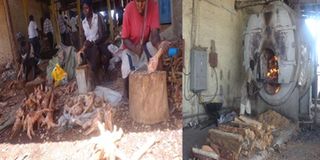How oil firm is burning up Karamoja valuable trees

Employees of Sun Beam Africa Ltd chop sandalwood into small pieces. The company has felled 240 tonnes of sadalwood trees in the last three years.
What you need to know:
In semi-arid Karamoja is a little treasure called sandalwood trees. Unfortunately, this endangered specie is being fast depleted by an investor.
From a distance, black smoke billows up the evening sky, leaving the better part of Tororo Town in a dark cloud.
On closer scrutiny trying to identify the source of the smoke, writings of ‘Sky Beam Africa Limited’ offer the answer. A mean looking guard at the entrance watches the goings on, his eyes darting in all directions for suspicious movement.
Strangers are not granted access to the premises. However, with the help of National Environment Management Authority (Nema) officials, I was granted access.
Inside the factory, about 30 people, mostly women with their children strapped to their backs, chop sandal wood tree into smaller pieces. These would later on be heated to extract oil.
Our treasure
Sandalwood is a rare tree in Uganda. It is only found in the semi-desert districts of Moroto, Nakapiripiti, and Kotido, and it is protected by Convention on International Trade in Endangered Species of Wild Fauna and Flora (Cites), which Uganda is party to. The treaty seeks to regulate international trade in Fauna and Flora that may threaten their survival
The wood from this tree is heavy, yellow, fine-grained and contains aromatic oil.
For this reason, it has been widely exploited in Asian countries for years, with its oil being used in the formulation of perfumes, lotions, soap and candles, medicine and spread on the skin to purify the complexion.
It is also used to heal skin rash and Indians often use them in their shrines.
Some people equate its value to that of diamond and gold. Asian countries are now looking for raw materials in Africa, and one of the companies exploiting the tree, is Sky Beam Africa Limited.
Numbers being lost
Due to its demand, Dave Tarumrumar, the Sky Beam Manager said to get oil for export, an average of 10 tonnes of trees are felled monthly. So far, 240 tonnes have been felled in a period of three years.
Tarumrumar, in interview describes himself as an investor operating in Uganda legally and a chemist by profession who started the company in 2010.
He said he was licensed by both National Environment Authority and Uganda Investment Authority (UIA) to distill and export oil.
Five years since he opened shop, Tarumrumar says the company has been exporting extracted oil to different parts of the world.
But Prof Nyeko Pen-Mogi, the Nema board chairperson, believes the 10 tonnes is unacceptable.
“You cannot cut down 10 tonnes of this tree in Karamoja, a desert area and you do not re-plant,” Nyeko said, after an impromptu visit to the factory last month. Nyeko has since then ordered Nema officials to carry out impact assessment in Karamoja pending a decision on whether to close the factory or not.
The problem
Isaac Ntujju, a senior environment inspector attached to Nema said the factory is violating the agreement that okayed its operations by cutting trees to that magnitude without reforestation as agreed.
Inside the factory, tree waste including unused trucks and ash are huge enough to cover existing trees and factory buildings.
The factory workers, all have tales to tell ranging from poor remunerations, long working hours and untimely sacking.
“You only count the day you work here. Tomorrow, the boss may come and dismiss you without any clear reason,” one of the workers identified only as Sarah, said as she showed off her bleeding left thumb. A kilo of fine sandalwood goes for a paltry Shs300.
Tarumrumar insists his workers are stubborn and do not want to use protective gear while on duty but when tasked by Nema officials to avail some of the gear, none was provided.
He said they are carrying out studies to ensure they invent fast growing sandalwood trees and plant them on a large scale. Sandalwood tree takes 10 to 30 years to fully mature depending on the fertility of the soil.
The 10 tonnes that is felled from Karamoja, is just a tip of the iceberg as almost the same quantity is used to heat up the distillers where fined sandalwood tree is dipped to force its cellular structure to release the needed oil.
Karamoja’s natural resources are fast getting depleted most leaders from the sub-region do not believe that this is even possible.
About sandalwood
Sandalwood is a tree with a highly aromatic wood. It is economically and culturally important to many countries around the Pacific and Eastern Indian Ocean regions where it grows or is traded. The wood is prized for making furniture, ornaments, sacred objects, carvings and joss sticks (incense). The essential oil is used in medicine, perfume and aromatherapy. Sandalwood is a parasitic plant, equipped with special structures on its roots that penetrate the roots of host plants and obtain nutrients. They grow in a variety of climates--from the desert to subtropical New Caledonia--and at elevations from sea level to over 8,000 feet.




